Opportunities for AI to Reinvent Post Sales
Learn how AI can reinvent post-sales by automating workflows and improving customer retention. Discover Jeff Williams' unique team structure and strategies for success. Watch now!

By Arun Balakrishnan
Cofounder and Head of Product
Aug 27, 2024
2 min read
Earlier this month, on August 15th, we hosted Ascend24 in Palo Alto - a half-day AI-Driven Growth Summit which brought together industry experts, thought leaders, and practitioners to discuss strategies for maximizing customer value and driving revenue growth.
Jeff Williams, CRO at Halcyon and Operating Partner at Bain Capital, delivered the keynote on the topic of AI in Post-Sales.
At Halcyon, customer success reports into Jeff. He delved deep into how AI can transform customer success operations.
Automating routine tasks: Streamlining processes such as data entry, ticket routing, and reporting, freeing up customer success teams to focus on high-value activities.
Providing predictive insights: AI can analyze vast amounts of customer data to identify potential churn risks, up-sell opportunities, and product adoption challenges. This allows customer success teams to proactively address issues and tailor their approach to each customer.
Personalizing customer experiences: Leveraging AI to deliver highly personalized interactions based on individual customer preferences and behaviors. This fosters stronger customer relationships and increases satisfaction.
Improving efficiency: AI can optimize resource allocation and reduce operational costs by automating tasks and identifying areas for improvement.
Jeff also went into great detail on how to re-think post-sales team structure. For example, at Halcyon, his post-sales team has four broad roles:
Client Service Managers (CSMs): Act as a bridge between sales and customer success, focusing on relationship building and ongoing customer engagement.
Technical Account Managers (TAMs): Responsible for the technical aspects of customer implementation, integration, and operations.
Customer Success Teams: Own the overall customer relationship and drive expansion revenue.
Account Executives: Responsible for acquiring new customers, contract negotiations, and closing deals.
To achieve an efficient team structure and to align the incentives correctly, Jeff recommended these key elements:
Bifurcation of responsibilities: Clear division of roles between sales and customer success to optimize productivity and avoid conflicts.
Collaboration between teams: Close collaboration between CSMs, TAMs, and customer success teams to ensure a seamless customer experience.
Incentive structure: Variable compensation for customer success teams based on net and gross retention, driving accountability and performance.
Watch the full video to learn more about Jeff and how he uses the power of AI to reinvent post-sales.




